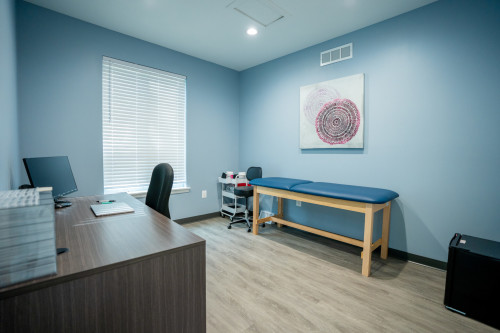






STR Behavioral Health - Cedar Creek
Verified Center
This provider's information has been quality-checked by Recovery.com's Research Team for accuracy and completeness, including center verification through appropriate third-party organizations.
Treatment Focus
At this center, you receive personalized care for mental health conditions. They provide therapy and tailor treatment to your unique needs, diagnoses, and preferences.
Primary Level of Care
Offering intensive care with 24/7 monitoring, residential treatment is typically 30 days and can cover multiple levels of care. Length can range from 14 to 90 days typically.
Treatment Focus
At this center, you receive personalized care for mental health conditions. They provide therapy and tailor treatment to your unique needs, diagnoses, and preferences.
Primary Level of Care
Offering intensive care with 24/7 monitoring, residential treatment is typically 30 days and can cover multiple levels of care. Length can range from 14 to 90 days typically.
Provider's Policy
STR Cedar Creek is in-network with many insurance companies and can also accept out-of-network benefits from other major insurance providers. We accept Geisinger Health Plan, MHC, Keystone Health Plan East, Quest, and Allied Trades along with the insurance providers listed below. For those preferring to pay for treatment directly, we offer a private-pay rate.
STR Behavioral Health - Cedar Creek
STR Behavioral Health - Cedar Creek
About STR Behavioral Health - Cedar Creek
STR Behavioral Health provides individualized and comprehensive care for individuals experiencing mental health, addiction and co-occurring disorders throughout their locations in Pennsylvania. Their Cedar Creek facility specializes in treating primary mental health conditions within a 30-bed facility offering an ideal client-to-staff ratio. Nestled on 13 acres, the unique facility was designed with intimate and personalized care in mind.
Mental Health Treatment
Treatment approaches are tailored to the individual and include a blended variety of evidence-based, experiential and holistic practices depending on the needs of each client. Throughout their stay, clients participate in individual, group and family therapy sessions and activities. Clinical teams are made up of compassionate and caring staff who are experienced in treating complex cases in adults 18 and older. Treatment emphasizes cultivating strong connection with peers, family and providers, creating an environment that establishes meaningful relationships.
Family Support Program
STR’s family program focuses on healing the entire family along with the individual experiencing mental health conditions. The program offers weekend appointments for in-person family counseling, in addition to a family support group that meets virtually. Members of the family program focus on turning denial into awareness, setting boundaries, effective communication, understanding the stages of relapse, healing relationships and offering support. In addition to improving overall family functioning and increasing a loved one’s chances of success, the family program helps family members become and stay involved in treatment.
LGBTQ+
STR is nationally recognized by the Human Rights Campaign for the services they provide to the LGBTQIA+ community. Staff members are specially trained on the specific struggles and needs of the community, and are educated in the unique trauma experienced by gender and sexual orientation. Their program provides a welcoming and safe gender-affirming environment that includes affirming housing, clinical processing groups, psycho-educational groups and individualized treatment plans.

Center Overview
Treatment Focus
At this center, you receive personalized care for mental health conditions. They provide therapy and tailor treatment to your unique needs, diagnoses, and preferences.
Joint Commission Accredited
The Joint Commission accreditation is a voluntary, objective process that evaluates and accredits healthcare organizations (like treatment centers) based on performance standards designed to improve quality and safety for patients. To be accredited means the treatment center has been found to meet the Commission's standards for quality and safety in patient care.

Insurance Accepted
Cash Pay Rates
Estimated Cash Pay Rate
Center pricing can vary based on program and length of stay. Contact the center for more information. Recovery.com strives for price transparency so you can make an informed decision.
Meet Your Care Team

Cory Cooper
CEO

Dr. Matthew Sommons
Medical Director
M.D.

Dr. Newman
Psychiatrist
MD

Monique LaMontagne
Nurse Practitioner
MSN, BA,RN, PMHNP

Joseph Boyer
Office Manager

Wadia Johnson
Executive Chef

Mike Brill
Therapist

Joseph West
Therapist
MA

Tierra Reid-Carter
Therapist
MS

Victoria Whitney
Therapist

Ry Dekis
Holistic Practitioner

Ellen Davis
Night Time Supervisor

Mace Marianna "Mace" Cooper-Drew
Family Therapist
MA, LPC

Mitch Cotto
Care Manager
Levels of Care




Your Care Options
Specializations
Anxiety
Anxiety is a common mental health condition that can include excessive worry, panic attacks, physical tension, and increased blood pressure.
Bipolar
This mental health condition is characterized by extreme mood swings between depression, mania, and remission.
Depression
Symptoms of depression may include fatigue, a sense of numbness, and loss of interest in activities. This condition can range from mild to severe.
LGBTQ+
Addiction and mental illnesses in the LGBTQ+ community must be treated with an affirming, safe, and relevant approach, which many centers provide.
Obsessive Compulsive Disorder (OCD)
OCD is characterized by intrusive and distressing thoughts that drive repetitive behaviors. This pattern disrupts daily life and relationships.
Who We Treat
LGBTQ+
Addiction and mental illnesses in the LGBTQ+ community must be treated with an affirming, safe, and relevant approach, which many centers provide.
Men and Women
Men and women attend treatment for addiction in a co-ed setting, going to therapy groups together to share experiences, struggles, and successes.
Approaches
Evidence-Based
A combination of scientifically rooted therapies and treatments make up evidence-based care, defined by their measured and proven results.
Experiential
Expressive tools and therapies help patients process past situations, learn more about themselves, and find healing through action.
Family Involvement
Providers involve family in the treatment of their loved one through family therapy, visits, or both–because addiction is a family disease.
Individual Treatment
Individual care meets the needs of each patient, using personalized treatment to provide them the most relevant care and greatest chance of success.
Therapies
1-on-1 Counseling
Patient and therapist meet 1-on-1 to work through difficult emotions and behavioral challenges in a personal, private setting.
Meditation & Mindfulness
A practiced state of mind that brings patients to the present. It allows them to become fully aware of themselves, their feelings, and the present moment.
Art Therapy
Visual art invites patients to examine the emotions within their work, focusing on the process of creativity and its gentle therapeutic power.
Experiential Therapy
With this approach, patients heal by doing. Therapists help patients process difficult emotions to speak, using guided activities like art or dance.
Family Therapy
Family therapy addresses group dynamics within a family system, with a focus on improving communication and interrupting unhealthy relationship patterns.
Life Skills
Teaching life skills like cooking, cleaning, clear communication, and even basic math provides a strong foundation for continued recovery.
Psychoeducation
This method combines treatment with education, teaching patients about different paths toward recovery. This empowers them to make more effective decisions.
Relapse Prevention Counseling
Relapse prevention counselors teach patients to recognize the signs of relapse and reduce their risk.
Conditions We Treat
Schizophrenia
Schizophrenia is a serious mental health condition that causes hallucinations, delusions, and disordered thinking.
Personality Disorders
Personality disorders destabilize the way a person thinks, feels, and behaves. If untreated, they can undermine relationships and lead to severe distress.
Anxiety
Anxiety is a common mental health condition that can include excessive worry, panic attacks, physical tension, and increased blood pressure.
Bipolar
This mental health condition is characterized by extreme mood swings between depression, mania, and remission.
Depression
Symptoms of depression may include fatigue, a sense of numbness, and loss of interest in activities. This condition can range from mild to severe.
Obsessive Compulsive Disorder (OCD)
OCD is characterized by intrusive and distressing thoughts that drive repetitive behaviors. This pattern disrupts daily life and relationships.
Languages
Aftercare
Care Designed for Your Needs
Personal Amenities
Amenities
Special Considerations
LGBTQ group
Group therapy unites LGBTQ+ patients in a safe and culturally competent setting, encouraging peer support under the expert leadership of a therapist.
Activities
Yoga
Yoga is both a physical and spiritual practice. It includes a flow of movement, breathing techniques, and meditation.
Smoking and Vaping Policy






